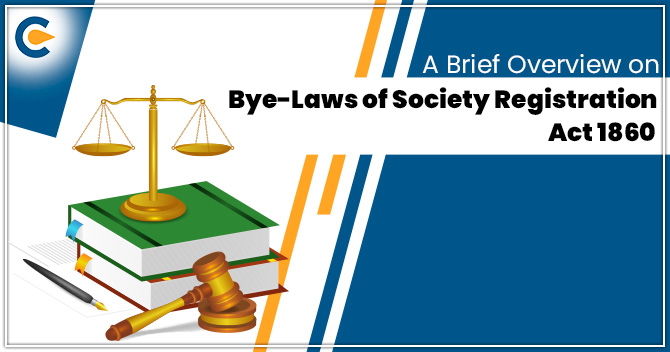In the legal context, a registered society is known as the group of enthusiasts that works for the betterment of society in ways mentioned under the bylaws. Registered Societies India comes under the Society Registration Act, 1860 that entails a long list of bye-laws. The said Act governs almost every facet of society and serves as a legal framework for the same. Formulation of the bylaws is in the hand of the serving members, and they are mandated to serve such a purpose in accordance with the aforesaid Act. Bye-laws intend to ensure the complete regulation of the society that comes under the Society Registration Act, 1860. In this write-up, we will discuss the bye-laws of Society Registration Act, 1860, in detail.
What is the Role of Bye-Laws of Society Registration?
- Bye-laws refer to the legal guidelines that aim to regulate different affairs of society and its functioning.
- Bye-laws also assist in providing a clear roadmap when it comes to overcoming legal disputes.
- Bye-laws provide statutory measures that can be taken against the member alleged for violating his/her duties for the sake of personal benefits.
- Bye-laws under the said Act enable the society to underpin legal measures to manage various affairs, including dissolution, misconduct, fund allocation, suits requirement, document inspection, and so on.
- It underlines a definite protocol for the appointment of members or delegation of power.
By drafting the bye-laws, the office-bearer or active members are mandated to take Society Registration Act, 1860 into account
Steps involved in the outlining & incorporation of bye-laws of Society Registration
1. Pens down the exact purpose behind the incorporation of the bye-laws. To serve that purpose, make sure to take the fundamental objective of the proposed society. It can keep legal difficulties at bay.
2. Designate key members to outline the bye-laws. Keep in touch with the field expert before doing the same.
3. Incorporate relevant sections & articles in a readable format. The comprehensive bye-laws of a society usually entail the following details;


Apart from the aforesaid areas, the MOA also underpins the;
- Penal provisions for members accused of violating certain laws
- Norms for conducting committee meetings to discuss any affairs
The clauses described above may differ case-wise.
Why bye-laws of Society Registration are is vital for the Society existence?
It’s because
- Bye-laws underpin a viable legal framework for the society that helps it to operate seamlessly.
- Bye-laws help in overcoming legal disputes and conflict that endanger the interest of the society and the members
- Bye-laws enable the societies to instil transparency within the organizational hierarchy owing to the clarity on the obligations of members cited under the Act described above.
- Bye-laws steer society in the right direction when it comes to addressing delicate affairs such as winding-up, fund allocation, etc.
Conditions for the Amendment of bye-laws of Society Registration
- The Amendment of any bye-law is not possible unless such an amendment is permissible under the Act.
- The provisions of Section 7 manifesting the guidelines to be met prior to the registration of the bye-laws of the society by the Registrar of the respective jurisdiction shall mutatis mutandis, also apply to the registration of amendments, provided that the Registrar shall prior to registration of an amendment of bylaw consult:
(a) The State Co-operative Union if the Amendment of the proposed bylaws belong to the central or an apex society; or
(b) The circle co-operative union if the bye-laws that are proposed to be amended belong to any other societies, and
(c) The financial institution if the society has the outstanding loan
(3) Upon registering the proposed Amendment, a copy of the same will be shared with the society by the Registrar along with the registration certification enclosing the seal and the sign of the Registrar.
(4) In case of rejection, the Registrar will share his/her concern with the society by facilitating the refusal order manifesting the reasons for the same within seven days of the order shared with the society.
(4A) the Registrar shall discard an application pertaining to the Amendment of the bye-laws within 90 days from the date of receipt of the said application.
(4B) In contrary to the above condition, the society may approach to;
- Registrar of Co-operative Societies, if the application is made to an individual on whom the power of the Registrar is vested upon under subsection (2) of Section 3
- Government, if the application is made before the Registrar or the Government, shall, within 60 days from the date of receipt of such a concern, rolls out norms to the concerned authority to discard the same
Generalized Procedure for the Amendment of bye-laws of society registration
The following procedure is used in general for amending the bye-laws under society registration:
- The conduct of general meeting.
- The decision pertaining to the Amendment of bye-laws must get the approval of 3/4th of the members attending the meeting.
- The 2/3rd of active members must not be less than 1/3rd of the total members.
- The Registrar will stamp his/her approval for the proposed change if notified within thirty days of any amendment in the MOA[1].
- The committee must furnish four copies of prevailing bye-laws accompanied by the resolutions passed by the AGM.
- The Registrar will authorize the Amendment if it is found to be in line with the Society Registration Act, 1860.
- The Registrar will grant the certified amendment copy accompanied by the registration certificate.
Conclusion
Bye-laws act as a legal framework that steers society in the right direction and keeps it abreast of legal disputes. Besides, it also empowers societies to make an informed and viable decision under the demanding situation. Apart from that, bye-laws provide necessary ground to penalized the malpractices in and out of society. Keeps us prompted, in case, you seek more information on the bye-laws of Society Registration Act, 1860.
Read our article:What is Multi-State Cooperative Society?











